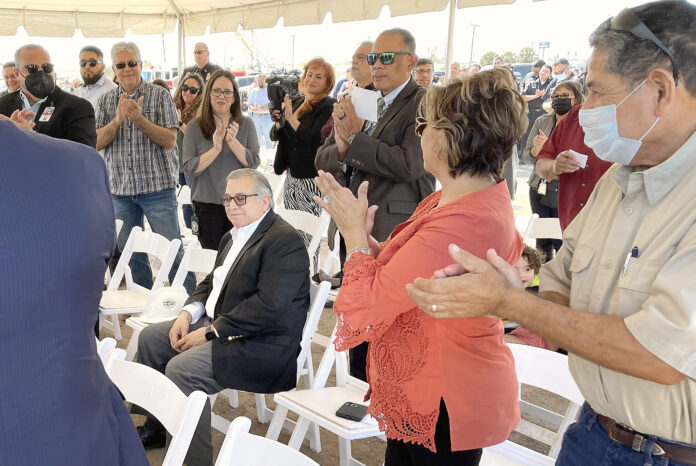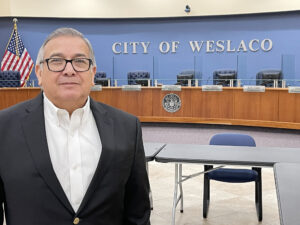
WESLACO — In the summer of 2019, officials here were preparing for another fiscal budget season and getting down to the nitty gritty on plans that had been set into motion that spring.
Already, a series of workshops had been scheduled throughout late July and August to provide department heads an opportunity to meet with city commissioners one-on-one advocating why their departments needed more funds for this piece of equipment or that piece of software.

(Dina Arévalo | [email protected])
It was a busy summer chock full of meetings and events and Weslaco City Hall hummed with activity. In the center of it all was City Manager Mike Perez, who, like a conductor, weaved each instrument into the score at just the right time and right tempo. It was, after all, the type of thing he had been doing nearly every day for the past four decades — running a city.
But what many didn’t know — what Perez himself kept close to the vest — was that he had been diagnosed with colon cancer.
The disease was quick, and the recommended treatment even quicker: surgery, to be followed by weeks of recuperation at home.
He underwent the surgery, which was successful in removing the cancer from his body, but felt that remaining sidelined for six weeks was out of the question.
“The problem is I have a real commitment to whatever I do and so it was budget season, we were doing union negotiations,” Perez said, sitting at a makeshift workspace in Weslaco City Secretary Norma A. Cantu’s office Friday morning.
“As the city manager, you’re like the CEO of a company, you gotta take care of it. I just felt a deep sense of obligation to make sure it’s taken care of,” Perez added, likening the city staff to a rural high school football team where many on the roster play “both ways” by necessity.
He remained in the hospital for six days and recuperated at home for another seven before returning to city hall to run the budget workshops. The only clue belying his ongoing recovery were the looser fitting clothes he wore in place of his normal trousers and sport coat.
Weslaco Mayor David Suarez would later joke during one of those workshops that Perez had returned to city hall still wearing his hospital slippers.
Weslaco passed its budget that September, complete with a sizable rainy day fund. The budget also included new voter-approved debt in the form of a 3 cent tax increase meant to finance some $10 million in loans for drainage improvements.
That voters had approved the issuance of new debt when Weslaco was still reeling from a years-long public corruption scandal, as well as a trio of back-to-back natural disasters was a remarkable feat in itself.
That Weslaco — and Perez — had accomplished it without a hiccup, even while he battled cancer, was a testament to Perez’s career-long habit of leading from the front.
And that leadership habit is part of the legacy he left behind as he retired Friday after seven years of service with Weslaco, and 44 years total in public administration.
“Even to his last day, even when he told me in June what he wanted to do, that it was his time to leave, he’s been at 150%,” the mayor said Friday afternoon.
Perez came to Weslaco in 2014, the year after Suarez was first elected mayor. He came to a city that had been wracked by political corruption and a multimillion dollar fraud scandal that allegedly involved multiple public officials.
Today, many of those officials, including former City Commissioners Gerardo “Jerry” Tafolla and Juan Cuellar have been indicted or have pleaded guilty to federal bribery charges. Another former commissioner, David Fox, has pleaded guilty to perjury.
Their charges stem from an alleged pay-to-play scheme regarding the $38.5 million rehabilitation of Weslaco’s water treatment facilities. Currently, the half dozen defendants still await the final dispositions of their cases in the series of related court proceedings.
A civil suit against the contractors also remains pending.
Perez was brought in to clean up the financial mess — hired to consult for three months in what Suarez characterized as “an 11th hour decision.” He came to a Weslaco plagued by controversy not long after facing a controversy of his own.
Just one year earlier, in 2013, Perez had been accused of sexual harassment in McAllen, where he had served as city manager for 22 years.
He was accused by an assistant city manager, who claimed Perez favored “female employees who do not resist your sexual advances or inappropriate comments,” according to Monitor archives.
He was placed on paid administrative leave, but after an independent investigation, the McAllen City Commission ultimately found Perez had made inappropriate comments, but had not — as the woman’s complaint stated — made any sexual advances toward anyone.
He retired from McAllen soon after.
When asked if the incident had changed the way he chose to manage, Perez said no.
“I had a chance to reflect. Should I change how I handle employees’ performance issues, and do I change it and become what I call more cold, which is safer for me?” Perez said.
“I reflected on it and I said no, it’s not fair. It’s not fair to the employees,” he said.
And so Perez came to Weslaco on a three-month contract. It wasn’t long until Perez began to implement a key professional principle.
“He’s got a rule of the three ‘I’s,’” Suarez said.
“All the decisions I make, I always ask, ‘Is it illegal, immoral or improper?” Perez explained.
Together, Perez, Suarez and Fox — whom Perez called “the leader of the loyal opposition” — would meet in the mayor’s office to discuss “how (to) get things to settle down” while keeping that principle in mind.
“We all need to be in the same boat, rowing in the same direction,” Suarez said of the theme of those conversations.
Within six months, the trio had done just that. After that, the goal became to put Weslaco in a position where it could begin planning for the future, and have the capital do so.
Though not an accountant by trade, Perez has another habit — of planning budgets five years in advance. And that habit served Weslaco well when it sought out a new financial rating from Standard and Poor’s.
The financial rater was surprised when Perez, who had only been with Weslaco for a few months at that point, emailed his five-year budget while they were still discussing the rate process on the phone.
Weslaco ultimately received an AA- rating, the highest in the city’s history.
Included in that budget was a capital improvement plan, or CIP. It was essentially a big ticket to-do list. Weslaco’s CIP has seen the funding of street repairs, drainage improvements, a park and a new fire station.
It’s also responsible for Friday’s groundbreaking of the new public safety building, as well as the future development of a new library, and more.
“He’s always thinking two or three steps ahead,” Suarez said.
But more than the infrastructure improvements, the mayor said he was most impressed with Perez’s knack for mentoring his staff.
“He takes others with him and molds them and educates them to be a better person,” Suarez said.
Perhaps nowhere is that more evident than with two staffers in particular — Cantu, the city secretary, and Omar Rodriguez, director of the Parks and Recreation Department.
Both staffers followed Perez here from McAllen and have worked for him for about two decades each.
“He takes care of us, he guides us, he counsels us,” Cantu said.
“He connects with the staff real well and the staff feels like part of the family,” Rodriguez added.
Cantu and Rodriguez spoke of how Perez engenders such strong loyalty among his employees by first showing them loyalty himself.
“I’m a big believer that a happy organization is a well-producing organization,” Perez said, adding that treating people with dignity and respect is paramount.
And one of the ways he accomplishes that is by modeling the behavior he wants to see in his employees.
One of the last, most vivid examples of that came when the COVID-19 pandemic first struck last year.
As repercussions from the pandemic reverberated across every facet of life, Perez became a living example of the social distancing safeguards meant to limit the spread of the pathogen.
Nor were Weslaco city staff immune to infection.
“At one time … 30% of the organization was out with COVID. Trying to provide police and fire and all the other services was very, very hard for those few months,” Perez said.
As more and more city employees contracted the virus, Perez’s hair grew longer and longer — a visual representation that he was making the same social sacrifices he was asking of his employees.
“Some employees were being a little cavalier, and so my hair was a reminder to everybody to be careful,” Perez said.
“When he let his hair grow, he looked like Benjamin Franklin,” the mayor quipped.
It was 15 months before Perez finally got his salt and pepper hair trimmed — once vaccines became available.
“My philosophy is I would never ask an employee to do something I wouldn’t,” Perez said.
Looking back at his tenure here, Perez said he would grade himself a B, saying there’s always room for improvement.
He’s most proud of the stability the city has been able to achieve, largely as a result of the city commission, which he said has never been afraid to question him or to double check his work.
“I tell them, you gotta do that. You gotta verify everything that we tell you. The worst thing you can do to us as employees is to blindly trust us. Verify,” Perez said.
But he wishes he could have accomplished more, including seeing the resolution of the water plant scandal and the cases that are currently wending their way through criminal and civil courts.
“Everyone needs to be reminded that they’re stewards of public trust, and that can’t be taken lightly,” Perez said.
“And if it comes out that it was true, that people did take advantage of the city and did profit from the city on the backs of the ratepayers and the taxpayers, then they gotta pay the piper,” he said.




